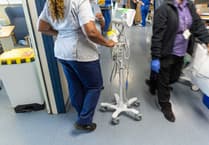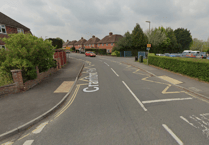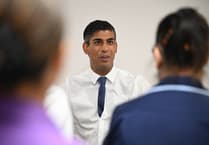A MEMBER of the community approached Bohunt School after he heard about the school’s immersion language programme.
Mr Theobald had a series of family papers, which he suspected were about his father’s work during the Second World War, but they were all in French, a language he didn’t speak.
He hoped getting students to translate the information would be an interesting project for them, as well as for him to find out more.
Students uncovered that Mr Theobald’s father fought alongside his brother in and around the Champagne region, and was taken prisoner. He was sent first to a prison and then a holding camp for people destined to be sent to German concentration camps.
They also found out he gained French citizenship after the war and later lived in Paris and Brussels, something Mr Theobald, from Haslemere, knew nothing about.
Lily and Honor, who were tasked with collating the translation work done by the whole class, said: “Our class were given a task to translate old French documents for Mr Theobald.
“He hardly knew his father, all he knew was that he was part of the French Resistance – so we translated the documents to find out his life. We all focused on different aspects and the two of us put it in order so that the story was clear.
“Mr Theobald came into the school and we presented him with the translated documents. It was really nice to see how much he appreciated it.”
Maia translated a particularly exciting document relating to active combat which included capturing German prisoners and attacking passing German convoys:
"Each person in the class had a couple of documents to translate, and whilst doing that we found out a lot about the French Resistance and the different kinds of jobs people had”, she said.
“For example, Mr Theobald’s father worked in communications as an interpreter. We all really enjoyed the challenge of piecing together this part of his life story."
Raphael Vallet, the students’ teacher, added: “It was an amazing opportunity, for which we are very thankful to Mr Theobald.
“He put the students’ skills to use for a real purpose. This really was immersion language learning, far removed from textbooks and simple academic tasks. It was a challenge, but they really rose to it.”
In 2010, Bohunt became the first secondary school in the UK to introduce immersion language teaching.
The innovative teaching methods see a group of students in key stage three taught a third of their curriculum in the target language, French, Spanish or even Mandarin.
Native language speakers take tutor time and teach subjects like information and communications techonology (ICT), PE, history, science and even maths in the target language. The maths lesson is taught in Mandarin also uses Chinese methods in numeracy.
The approach is so innovative that students from Bohunt were asked to visit Prime Minister David Cameron, to teach him some Mandarin before his visit to China last year.
The school was also filmed by the BBC for a programme about a group of Chinese teachers who came over to Liphook to see if their method were more successfull than Bohunt’s own teachers, which was shown this summer.
The evidence that the approach is working is now clear, five years into the programme, with excellent language results.
Students take their GCSE languages at the end of year nine, two years early and over the last three years students have achieved a 100 per cent pass rate, with approximately 75 per cent of students gaining A*/A grades.
Bohunt head Neil Strowger told The Herald: “This was exactly the sort of project students should be involved in, genuine resources for a genuine purpose.
“It shows that having the highest expectations for students and embracing challenge improves not only grades, but also attitudes towards learning as well.
“Schools sometimes don’t concentrate so much on attitudes and communication skills because they are hard to develop in students and don’t seem core to what schools do.
“The results of Bohunt’s immersion language programme, amongst other initiatives, suggest they should be concentrated on for students’ futures as well as the schools’ results.”



